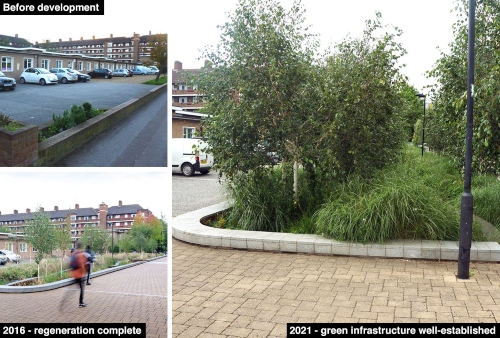
The latest requirements for trees in developments have been established in the July 2021 National Planning Policy Framework (NPPF) for England. The NPPF sets out what local planning authorities (LPAs) will require, when setting local policies and also considering planning applications for all developments.
The NPPF states that: ‘Planning policies and decisions should ensure that new streets are tree-lined and that opportunities are taken to incorporate trees elsewhere in developments’. This is backed up by other recent government and local guidance such as the National Model Design Code which says: ‘All schemes will be expected to follow national policy by achieving a 10% net gain in biodiversity. All new streets should include street trees.'
Tree maintenance requirement
However, measures need to be put in place to nurture and allow trees to mature, generally for decades, enabling them to actually deliver their real potential – including net carbon storage, urban cooling through shading and evapotranspiration, biodiversity and public wellbeing. So, the NPPF also requires that: 'Appropriate measures are in place to secure the long-term maintenance of newly-planted trees, and that existing trees are retained wherever possible.'
Urban trees and paving have traditionally been seen as in conflict. But this is not the case with concrete block permeable paving (CBPP), a key sustainable drainage (SuDS) technique to reduce flood risk and make cities more liveable. CBPP offers unique opportunities to collect, attenuate and treat rainwater runoff, removing pollutants before irrigating green infrastructure. Unlike conventional impermeable hard landscape materials, CBPP allows the same pattern of run-off transfer to the ground as natural vegetation, allowing water to reach tree and shrub roots, despite providing an attractive hard surface above. Local planning authorities now need to incorporate long-term tree maintenance measures in their planning consents and a straightforward spatial measure, such as permeable paving providing irrigation, offers a holistic multifunctional solution.
Beneficial relationship
In a previous article, Interpave explored the 20-year beneficial relationship between CBPP and trees at the Martlesham Park and Ride scheme. Here, concrete block permeable paving has operated efficiently with minimal maintenance amongst extensive tree planting without root disruption or other issues.
The benefits for trees while retaining accessibility are recognised by the current Code of Practice for accessibility in the external environment, BS 8300-1:2018, which states that: 'Tree grilles should be avoided. Smooth or paved permeable surfaces should be used wherever practicable.' CBPP can be laid level and still avoids puddles without the need for drainage gulleys. It provides a safe, firm, pot-hole free surface for everyone – including wheelchair users and people pushing prams. Two decades of experience in the UK has demonstrated the long-term performance of CBPP with minimal, if any, maintenance.
CBPP generally comprises an upper layer of concrete blocks with permeable jointing and laying course, over a sub-base and other structural layers of permeable material for water storage. Interpave is currently exploring new ways of applying CBPP to optimise gradual supplies of water for tree irrigation at both levels, as well as effective interaction with tree planters and proprietary tree pit systems. Paving layouts are also being considered to maximise the permeable paving catchment area for tree irrigation, particularly outside the protective tree-canopy zone. Interpave would be pleased to hear from anyone considering integration of permeable paving and trees on projects (email: chris.hodson@paving.org.uk)
 Low intervention retrofit
Low intervention retrofit
Another important innovation, particularly for urban regeneration, is the retrofitting of CBPP as an overlay to existing, conventional road bases or other hard surfaces. These low-intervention, thin overlays create attractive, safe and sustainable shared-surfaces. They can be particularly effective when used to supply a gradual flow of clean water horizontally into raingardens or bioretention areas with trees and other green infrastructure, via simple slot inlet/outlets, to store water for irrigation and biodiversity, as well as SuDS. Such low-intervention techniques enable transformation of the public realm in response to the raft of recent active travel, low traffic and open space initiatives.
This approach is exemplified in Bridget Joyce Square, London, an important regeneration project designed by Robert Bray Associates (RBA) in conjunction with McCloy Consulting for the London Borough of Hammersmith and Fulham, which won the top prize at the 2017 Landscape Institute Awards. Here, a typical, adopted asphalt street and adjacent parking areas were transformed for community use with
CBPP overlay shared surfaces and tree-planted raingarden basins – an exemplar for future urban landscapes. The basins provide water storage for SuDS to reduce overloading existing drains (in the absence of the CBPP sub-base), as well as for irrigation.
Well-established green infrastructure
Interpave revisited the project in August 2021, around five years after completion, and noted that trees and other green infrastructure were healthy, substantial and particularly well-established. The permeable paving is also performing well and, it is understood from local sources, experienced no problems during recent extreme summer storms, despite extensive flooding nearby.
RBA founder, SuDS expert and landscape architect Bob Bray commented: ‘All the plants have grown really well. Birches are particularly sensitive to drought and urban heat island effect but they have thrived here and the vegetation has remained green all summer. The critical thing seems to be that even small rainfall events are captured by the permeable paving in summer and with larger events concentrated in the basins.'
For project case studies and guidance on all aspects of permeable paving and SuDS visit: www.paving.org.uk
Chris Hodson is a consultant to Interpave












